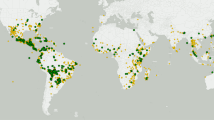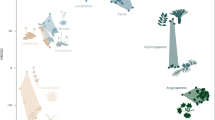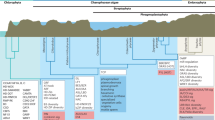Abstract
BOTANISTS show us an aspect of evolution-in-progress, so far as that can be shown, of which zoologists tell us nothing—because there is possibly nothing to tell. The evolution of plants is often indicated in terms of the appearance of the sexual differentiation in unicellular organisms, of the appearance of multicellularity, of the total life-cycle of one plant as an alternation of two generations, asexual and sexual, the individuals being sometimes morphologically distinct and independent, and of the various fate of these phases of the total life-cycle in, say, the moss, the fern and the angiosperm, when they are not distinct and independent individuals, “but the one remains permanently connected to the other like a parasite on its host plant” in Strasburger's-words.
This is a preview of subscription content, access via your institution
Access options
Subscribe to this journal
Receive 51 print issues and online access
$199.00 per year
only $3.90 per issue
Buy this article
- Purchase on Springer Link
- Instant access to full article PDF
Prices may be subject to local taxes which are calculated during checkout
Similar content being viewed by others
Author information
Authors and Affiliations
Rights and permissions
About this article
Cite this article
MCKERROW, J. Polyphyletic Origin of Metazoa from Plants. Nature 135, 1041–1042 (1935). https://doi.org/10.1038/1351041d0
Published:
Issue Date:
DOI: https://doi.org/10.1038/1351041d0
Comments
By submitting a comment you agree to abide by our Terms and Community Guidelines. If you find something abusive or that does not comply with our terms or guidelines please flag it as inappropriate.



